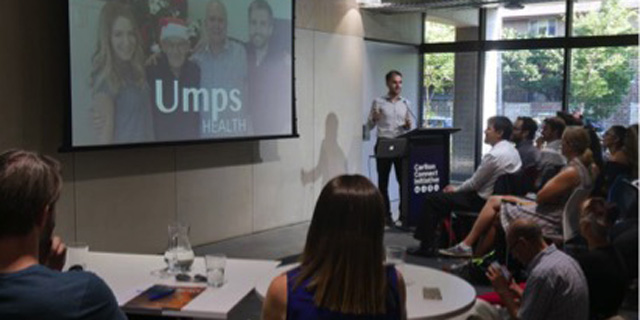Artificial intelligence that supports care in the home
Artificial intelligence is a domain in computer science that seeks to simulate human intelligence

Image: Adam Jahnke presenting Umps Health
Artificial Intelligence (AI) will fundamentally change the way we do things as it enables autonomous vehicles, sensor-based health monitoring and ‘smart-homes’. The aged care services industry is neither exempt nor oblivious to this change. In February 2014, The Aged Care Industry Information Technology Council and Accenture jointly released a vision for information technology across aged care services, and both AI and the Internet of Things were identified as key opportunities at the Information in Aged Care Conference in November 2016.
A key principle of AI is the ability to learn, and while we haven’t yet created the sorts of AI popularised in fiction (like Rosie from the Jetsons), you may be surprised at the amount of AI you already interact with. Netflix uses advanced algorithms to assess peoples’ interests and make tailored predictions on content we like with a high degree of accuracy. Pandora uses AI to analyse complex characteristics in music and build custom playlists for us, and Siri is constantly learning how to more effectively respond to human language questions. It is easy to imagine how this technology could be applied to support carers and older people living independently.
Imagine the situation where your father boils water at 2:43AM and again at 3:17AM. This is not entirely unusual for your dad, who often has a cup of tea after working late on his computer. However, a machine learning program assesses this in conjunction with the large number of lights that have been left on in the house, the fact that the computer hasn’t been used all evening and knowledge that your dad made toast half an hour earlier. Further analysis against population data suggests that this combination of anomalies could be associated with a loss of sense of time, an early symptom of dementia. The software could then review your calendar against available appointments with your father’s GP, and make a tentative booking on your behalf.
I am a believer in the power of AI because I use it to provide better care to my family. After designing a solution like the above for my grandpa, I founded Umps Health, a company that uses connected devices to collect data about how people interact with their appliances, like their kettle, TV or microwave. Our machine-learning platform generates tailored insights based on past patterns of behaviour, and raises an alert to carers when behaviour is out of the norm. With this technology, we can better inform carers when an incident (like a fall) may have occurred, or when someone’s behaviour demonstrates they are at heightened risk of an incident. This was the topic of a recent presentation at the Melbourne Accelerator Program’s Social Impact Showcase, where Umps Health was were awarded the Gourlay-Trinity Impact Prize for ‘demonstrating exceptional knowledge in a social issue’.
As the capabilities of AI grow, there is a social imperative to the adoption of AI-based services. Firstly, AI can help people like my grandpa to age in place, making greater sense of large amounts of data to predict and potentially prevent an incident like a fall. Secondly, AI can provide peace of mind to the 2.8 million Australians providing unpaid care each year, allowing them to participate in paid employment and reducing the physical and emotional stress associated with unpaid care.
For more information: http://www.umpshealth.com
[Source: Adam Jahnke, founder and CEO of Umps Health, a company that uses machine learning to enable better living outcomes for older people. Adam has previously worked on smart city and smart home projects throughout Australia and South-East Asia. He is also studying a Master of Public Health at the University of Melbourne, with a research focus on international and intergenerational responses to the challenges associated with ageing.]